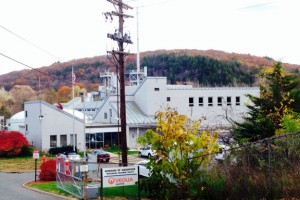
NAUGATUCK — The state Department of Energy and Environmental Protection has issued the borough an ultimatum: either begin bringing the wastewater treatment plant into compliance or cease operations.
The Board of Mayor and Burgesses Tuesday night approved a resolution to bond up to $2.16 million to begin upgrades to the treatment plant on Cherry Street Extension. The authorization was sent to the Board of Finance for approval.
The bond comes six months after voters rejected at a referendum bonding $12.43 million bond for upgrades to the plant, which is operated by Veolia Water North America.
New environmental guidelines state that municipalities with wastewater treatment facilities must make millions of dollars in upgrades to mitigate pollutants, which includes limiting the levels of nitrogen and oxygen plants release.
The state DEEP, on behalf of the federal Environmental Protection Agency, has issued Naugatuck an administrative order that forces the borough to move forward with EPA-mandated plant upgrades. The state agency issued the order on March 30.
Mayor Robert Mezzo said state officials saw the vote to decline the bond as a message that the borough had no intention of making the upgrades and felt it needed to issue an administrative order.
“The Department of Energy and Environmental Protection issued an administrative order requiring us to make those or shut down various operational components of our sewage treatment facility,” Mezzo said.
Since the administrative order has been issued, the borough is able to authorize bonding legislatively, rather than sending the bond back out for another vote, Mezzo said.
The $2.16 million bond, which Naugatuck will pay back with interest over time, will be put toward plans, studies, reports, evaluations and testings to determine exactly what engineering, architectural work and financing the borough needs to comply with new federal environmental guidelines, Public Works Director Jim Stewart said.
The bond also includes repairs to the siphon for Fulling Mill Brook at North Main Street.
The siphon contains a sewage line that runs under North Main Street and the walls have been slowly washing out. Stewart previously said if the area becomes too unstable and collapses the sewage line could break and cause raw sewage to flow into Fulling Mill Brook, which flows directly in the Naugatuck River.
Stewart said the siphon repair project was estimated to cost $345,000 and money was put in the current budget to do the repairs. However, the bids came in higher.
Stewart said the bond authorization includes $580,000, which covers the lowest bid the borough received plus cost for the engineering work at the site. The borough plans to bid the work again in an attempt to get a better price, he said.
Stewart said this is the first of two bond authorizations for upgrades to the treatment plant. He expects to receive another administrative order from the DEEP within the next few weeks.
The second bond would include upgrades to the incinerator, which are projected to cost $10 million to $12 million, Stewart said.
Burgess Robert Neth asked if this meant the board will have to make a similar decision again in the next couple months for another bond.
“Either that or we shut our incinerator down,” Mezzo said.
There is also a third phase to the project. Stewart said this phase will include the recommendations for repairs and upgrades from a facility study that will be done during the first phase.
“We will have to decide how extensive the repairs are so there would be a third phase of design and construction,” Stewart said.
Stewart said that would be the most expensive part of the project.
“That’s the big nut. That’s the $50 million,” Stewart said.
Naugatuck’s share off the cost of the overall project would be offset by an estimated $10.7 million from Middlebury, which uses Naugatuck’s facility, and an amount to be determined from Oxford, which also taps into the system.
Neth asked how the borough would move forward with the third phase.
“At that point, do we then go back out to the public and ask for their blessing or do we continue to have judgments brought against the borough to do this,” Neth said.
Mezzo said it would depend on the timing of the project.
“Ultimately, this is not something any of us want to do, but we have very little choice not to do it,” Mezzo said.
The Republican-American contributed to this article.













